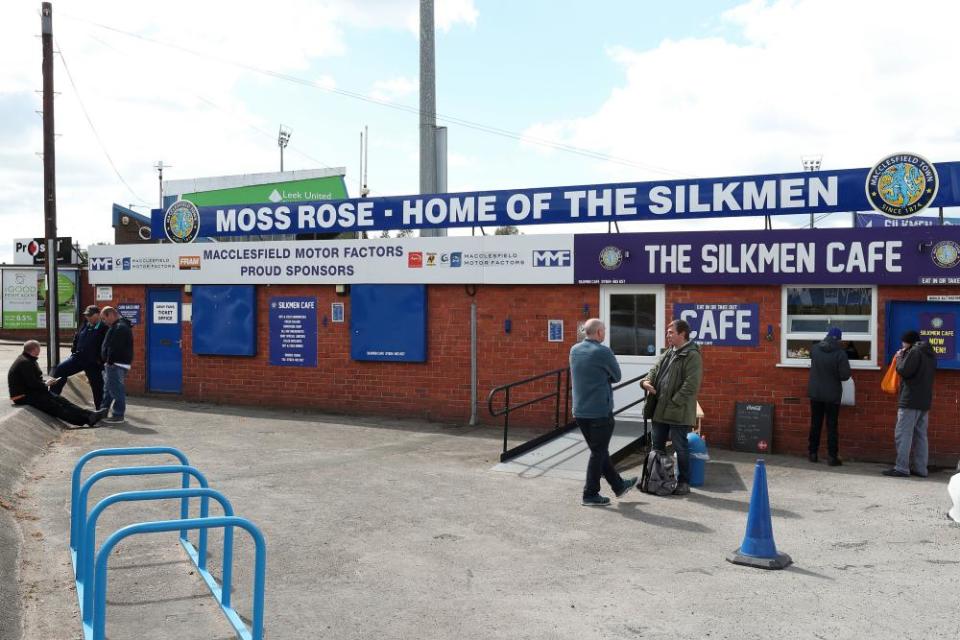'Players were in tears': what it was really like as Macclesfield collapsed
When James Pearson was coming round from knee surgery in hospital last November, it was a case of getting straight to work. As the Professional Footballers’ Association delegate at Macclesfield Town, a liaison between union and dressing room, unpaid wages meant more chasing. It was a prime example of the destabilising financial chaos that put paid to the club. “I was in bed on the phone to the players, the PFA, corresponding with the owner, talking about why we hadn’t been paid,” he says.
Even now Pearson has more questions than answers about the financial turbulence surrounding the owner Amar Alkadhi’s reign. “Across last season we had 10 different training locations. Knutsford to Stoke, to the University of Manchester – here, there and everywhere. Why was that? … But every player got on with it because – it shouldn’t be – but it was ‘the norm’; on a Sunday night we would have a text off [the former assistant coach and player] Danny Whitaker or a member of staff in the group chat telling us where we were going the next day, giving us the new postcode.”
Related: Macclesfield Town's demise was signposted but that doesn't make it less painful | John Brewin
Perhaps the saddest image of decline was the £500,000 listing, until removed last week, of Macclesfield’s Moss Rose stadium on Rightmove. Listening to Pearson, who recently retired through injury aged 27, document life at Macclesfield across the past two years is illuminating, if disheartening. Players and staff were paid late eight times last season, with the PFA helping to cover wages approaching Christmas – “some of the players needed the money to buy presents for their families” – and the Silkmen Supporters Trust loaning £10,000, about a seventh of the monthly wage bill, to assist in April. Some players could not afford fuel to get to training.

“In League Two a lot of players live month to month,” Pearson says. “When you’re in a dressing room and you see important players breaking down in tears two days before a game, it’s hard. The longer it went on, it was starting to affect people at home and if things aren’t going right at home, how the hell are you supposed to play football on a Saturday?”
As the PFA representative Pearson, the son of the former Watford and Leicester manager Nigel, proved a willing agony aunt of sorts and although team spirit meant “some days you would go in and think nothing was wrong”, on other occasions that was not the case.
“It really affected one player’s mental health, to the point of … the worst possible scenario,” says Pearson, puffing his cheeks, taking a moment to compose himself. “He’s got a girlfriend and a young child. Some people would come in and it would be, ‘We’re a laughing stock, let’s get on with it’, but then you see how it affects people in the opposite way.
“That was the worst feeling, receiving that text and reading some of the stuff that player was saying. My job then was to speak to the PFA, and I think he already had. The PFA try to guide you in the direction of help because that was what was needed … what was needed was for him to be paid on time.”
Macclesfield, relegated after being deducted 17 points, developed into such a mess that Pearson can recollect the months when players were paid on time with instant recall. “It was as if we had been rewarded for something. Mad, isn’t it?”
He adds: “It got to the point of waking up on a matchday to see if the money was in your account. I’ve seen some things which, as a player, you should never see. The owner was saying: ‘I’ve paid this person. Can you check and ask him?’ He was sending me screenshots of a payment out of a bank account. I saw a piece of A4 paper with who’s been paid, ticks next to their name. X amount, tick.”
Pearson insists Alkadhi, who acquired Macclesfield in 2003 alongside his brother, Bashar, is “not a bad person” but believes “pride will have taken over”. He acknowledges those words will sit uncomfortably with many but Alkadhi’s popularity plummeted long ago. “On the last day of the 2018-19 season we drew with Cambridge to stay up under Sol [Campbell], and we hadn’t been paid,” says Pearson. “He [Alkadhi] tried to come into the dressing room and I think someone said to him: ‘I wouldn’t go in.’ We were all celebrating and I think if he had come in he would have been covered in beer, but not for a good reason.”

 Yahoo Sport
Yahoo Sport 





































